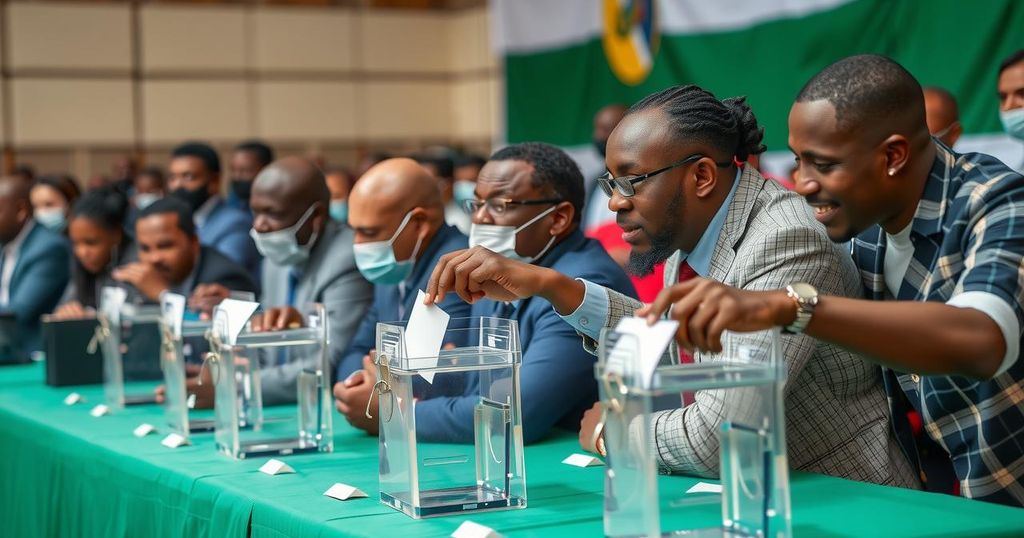World news
ABDALLAH SAMBI, AFRICA, AUSTRALIAN ASSOCIATED PRESS, AZALI ASSOUMANI, COMOROS, ELECTION FRAUD, GOVERNANCE, GOVERNMENT, HAMIDOU KARIHILA, HOPE OF THE COMOROS, INDIAN OCEAN, INDIAN OCEAN ARCHIPELAGO, JUWA, NO, NOUR EL - FATH, OPPOSITION, POLITICS, PRESIDENTIAL ELECTION, REUTERS, SUPREME COURT
Stella Nguyen
0 Comments
Comoros Voters Engage in Parliamentary Elections Amid Political Tensions
Voters in the Comoros are electing members for a 33-seat parliament amid allegations of electoral irregularities implicating President Azali Assoumani. Approximately 338,000 registered voters are participating, as various opposition parties exhibit differing strategies concerning the elections. The political landscape in the archipelago remains fraught with tension, particularly with Assoumani’s son being positioned for future leadership.
Voters in the Comoros have commenced the electoral process for the 33-seat parliament. This election follows the controversial re-election of President Azali Assoumani, which occurred a year prior and was characterized by allegations of irregularities from the opposition, claims that ruling party officials have firmly denied. Approximately 338,000 individuals are registered to exercise their voting rights, with polling stations opening early on Sunday.
In January 2020, the Comoros witnessed its last parliamentary elections, and nearly 100 candidates were vetted by the Supreme Court to participate in the current election cycle. Opponents of President Assoumani have accused him of authoritarianism, suggesting he may be grooming his eldest son, Nour El-Fath, for succession upon the conclusion of his presidency in 2029. Since seizing power through a coup in 1999, Assoumani has engaged in three subsequent electoral victories. In a notable development, Assoumani conferred extensive new powers upon his son in 2024, assigning him the responsibility of coordinating government affairs.
While some opposition factions, such as Juwa, have advocated for a boycott of the elections—particularly following the imprisonment of former President Ahmed Abdallah Sambi—others have opted to participate. Hamidou Karihila, representing the opposition Hope of the Comoros party, articulated his stance, asserting, “The Azali regime is weakened … by participating in these elections we are contributing to further exposing the flaws in its system and accelerating its inevitable fall.” Results from this election are anticipated by Friday.
The current parliamentary election in the Comoros is set against a backdrop of political tension and dissatisfaction with President Azali Assoumani’s administration. Since his initial rise to power through a coup in 1999, Assoumani has faced ongoing criticism for his governance style, which many characterize as authoritarian. The opposition has consistently accused him of manipulating electoral processes to maintain power, as evidenced by allegations surrounding his recent re-election. Moreover, the political landscape remains contentious, with several opposition parties advocating for participation in the elections while others call for a boycott. These dynamics highlight the ongoing struggle for political reform and transparency in the Comoros, an archipelago in the Indian Ocean.
In summary, the Comorian electorate is poised to participate in parliamentary elections amid significant political controversies and allegations of authoritarianism surrounding President Assoumani’s regime. The opposition, while divided on the strategy to contest the elections, remains vocal against the alleged electoral misconduct. As the election unfolds, its implications for the future political stability of the Comoros will be closely scrutinized, with results expected by Friday.
Original Source: www.moreechampion.com.au




Post Comment